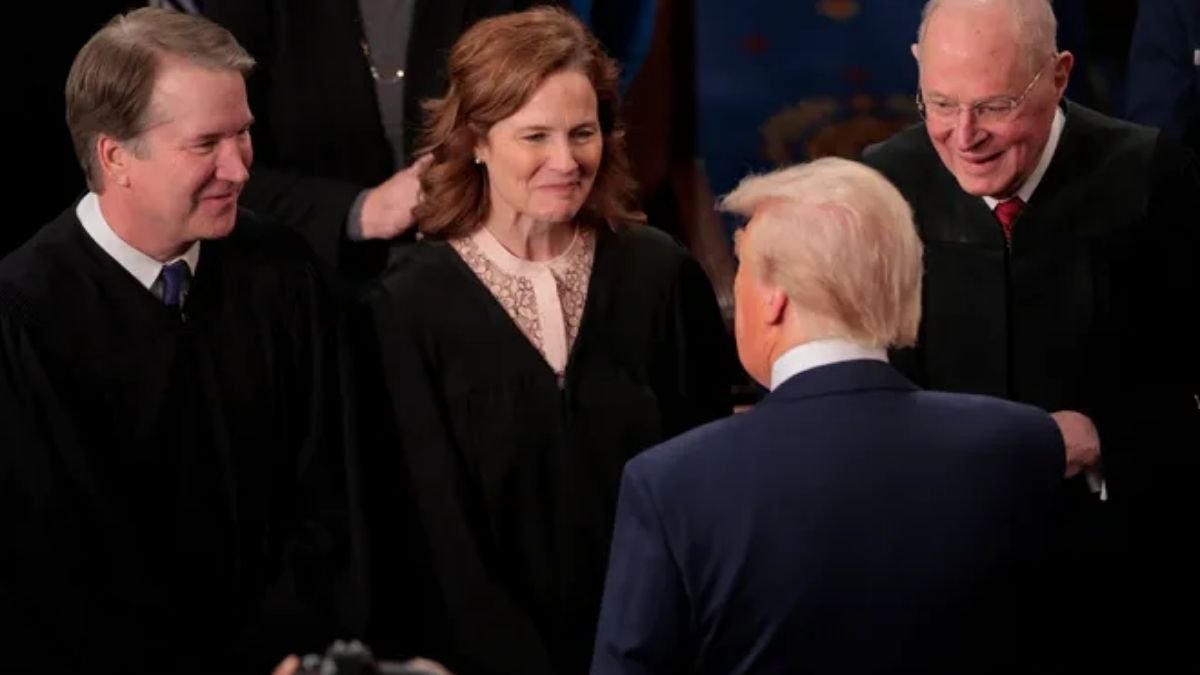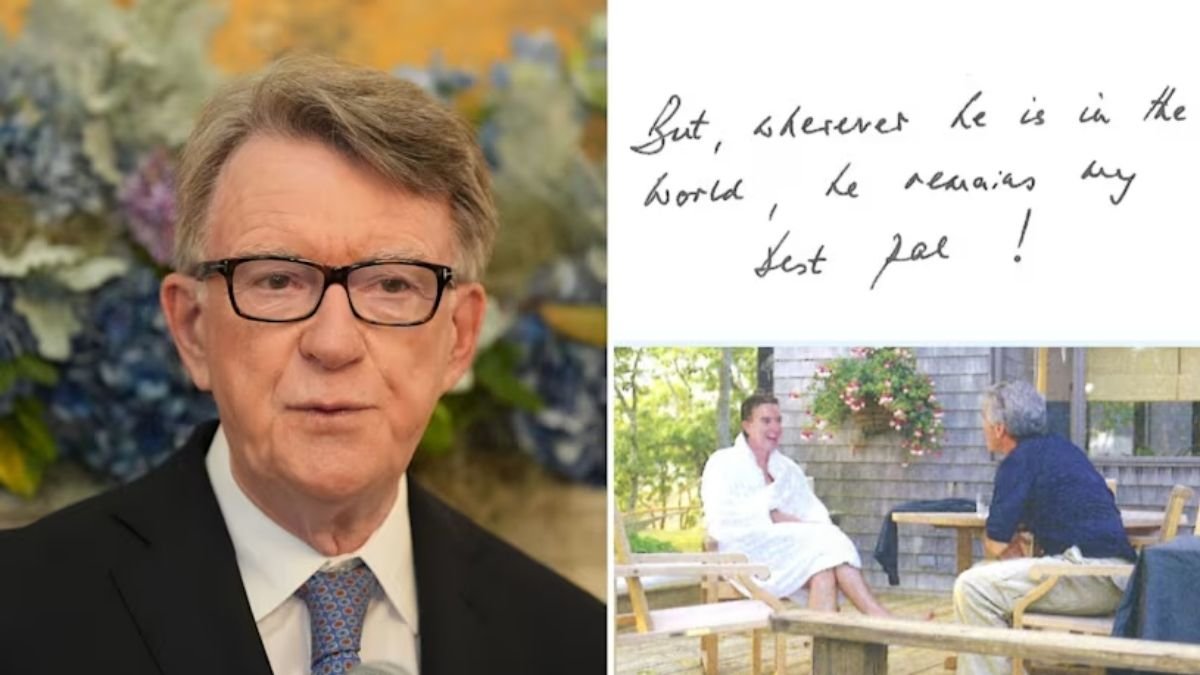When Barrett was nominated to the U.S. Supreme Court five years ago, many assumed she would be a steadfast ally for President Trump just as many critics feared. But in a recent interview with USA TODAY, Barrett made her stance crystal clear: “I’m nobody’s justice.”
- A Closer Look in Her New Book
- Barrett’s Approach: “Listen to the Law”
- No Automatic Wins for the Trump Administration
- First and Only Mother of School-Age Children on the Court
- Special Needs Parenting Shapes Perspective
- Courts Must “Stay in Their Lane”
- A “One Jalapeño Gal”
- Rejecting the “Swing Vote” Label
- Not a “Shrinking Violet”
Barrett has often surprised both supporters and skeptics, showing an independence that has at times positioned her as a swing vote on a court otherwise considered conservative. This independence has intrigued legal analysts and drawn ire from Trump’s most loyal MAGA followers. About the idea of a Trump call, Barrett laughed: “I might wonder if he had the wrong number.”
A Closer Look in Her New Book
In an hour-long, wide-ranging interview about her upcoming book, Listening to the Law, published September 9 by Sentinel, Barrett shared her perspective on her role, how motherhood shaped her legal insights, and why she challenged one of her liberal colleagues more vigorously than expected.

Barrett’s Approach: “Listen to the Law”
One of Barrett’s goals in writing her book was to convey that Supreme Court justices do not base decisions on personal preference or political ideology.
However, public skepticism remains high. A 2024 USA TODAY/Ipsos poll found that many Americans believe the court rules based on ideology rather than law. Pew Research Center data from September 3 shows public approval of the court at near three-decade lows.
Even within the court, criticism exists.
No Automatic Wins for the Trump Administration
Justice Ketanji Brown Jackson, one of Barrett’s liberal colleagues, recently suggested the court seemed to operate under a rule: “this Administration always wins.” Barrett disagrees.
“I don’t think it’s true,” she said, emphasizing that the court doesn’t approach cases like managing childhood disputes—“OK, well, you’ll win some, you’ll lose some.”
Yet, numbers show Trump often prevailed in emergency appeals, with most cases brought by his administration after lower courts blocked policies ultimately going his way. Barrett explained that her focus is on principles, not individuals.
“It’s about the presidency,” she said. “The decisions we make about executive power today set precedents for three or four presidents from now.” She acknowledged a gap between public expectation and the court’s long-term perspective: “We all live in the current moment, but the court is looking at the long haul.”
First and Only Mother of School-Age Children on the Court
At 53, Barrett is the youngest justice on the Supreme Court and could serve for decades. She is also the first—and only—mother of school-age children on the bench.
Barrett emphasized that her motherhood doesn’t influence the law: “The law is law whether you’re a mother or not, a man or a woman.”
However, raising seven children has offered real-world insight. In a January debate about alternatives to age verification for adult websites, Barrett challenged arguments that parents could easily filter content. “Content filtering for all those devices, I can say from personal experience, is difficult to keep up with,” she told the attorney.

Special Needs Parenting Shapes Perspective
Barrett also highlighted how parenting a child with Down syndrome informs her understanding of cases involving children with disabilities. She said it provides perspective on people’s experiences that lawyers appearing before the court might not share.
“I think most parents of children with special needs would tell you that it does something to your level of compassion and just how you perceive people,” she said.
Courts Must “Stay in Their Lane”
Barrett has joined rulings expanding presidential authority, including those granting presidents presumptive immunity for official acts. Critics argue these decisions disturb the Constitution’s balance of power.
Barrett maintains courts must avoid overgeneralizing or speculating about abstract checks-and-balances issues. “The overall patterns, or how we might feel about abstract issues, aren’t the stuff of which judicial decisions are made,” she said.
Her principle of staying within judicial bounds also informed a response to Jackson’s dissent on limiting judicial review of Trump policies. Barrett described Jackson’s critique as “tethered neither to conventional legal terrain nor to any doctrine whatsoever.”
A “One Jalapeño Gal”
Barrett’s blunt response garnered attention partly because it diverged from her usual restrained writing style, which she affectionately calls her “one jalapeño” style.
“I am typically a one jalapeño gal,” she said. “But I am from Louisiana, and I enjoy Tabasco once in a while.” She added that Jackson made important points that deserved a robust response.
Rejecting the “Swing Vote” Label
Trump praised Barrett for a decision months after some of his supporters criticized her for siding against the administration. Conservative activist Amy Kremer called Barrett “the biggest disappointment on the court.”
Barrett rejected the “swing vote” label. “Swing implies indecisiveness. You just kind of blow back and forth,” she said. “That’s not how I approach the law at all.”
Not a “Shrinking Violet”
Barrett also addressed misconceptions about her demeanor. Early perceptions painted her as timid or lacking confidence, but she believes her record dispels that notion.
She concluded by emphasizing judicial independence: “I’ve disagreed with all of my colleagues at different times, but that’s because I’m not trying to march in lockstep with anyone—nor is anyone else. We’re just trying to get the law right. I’m a lawyer.”















